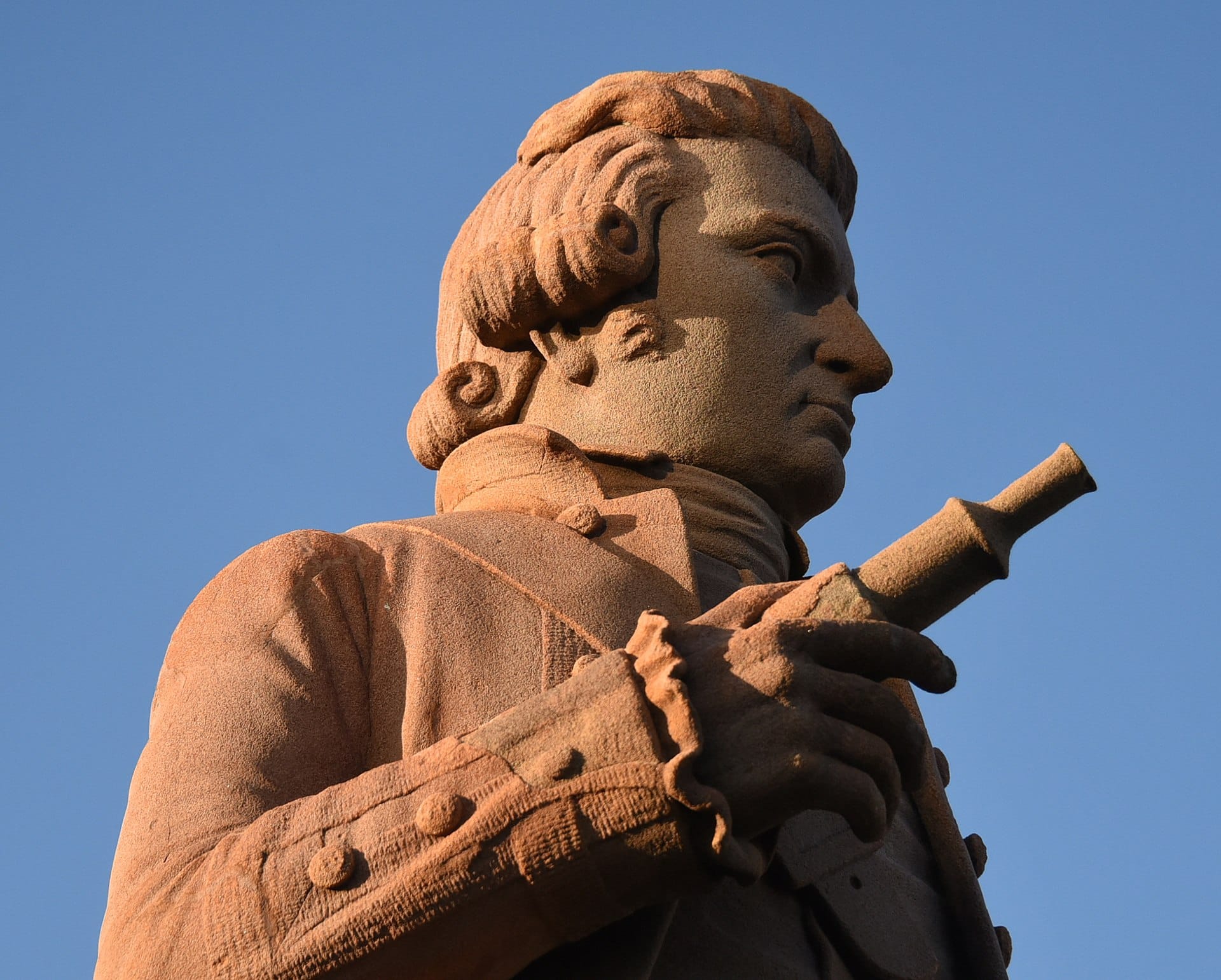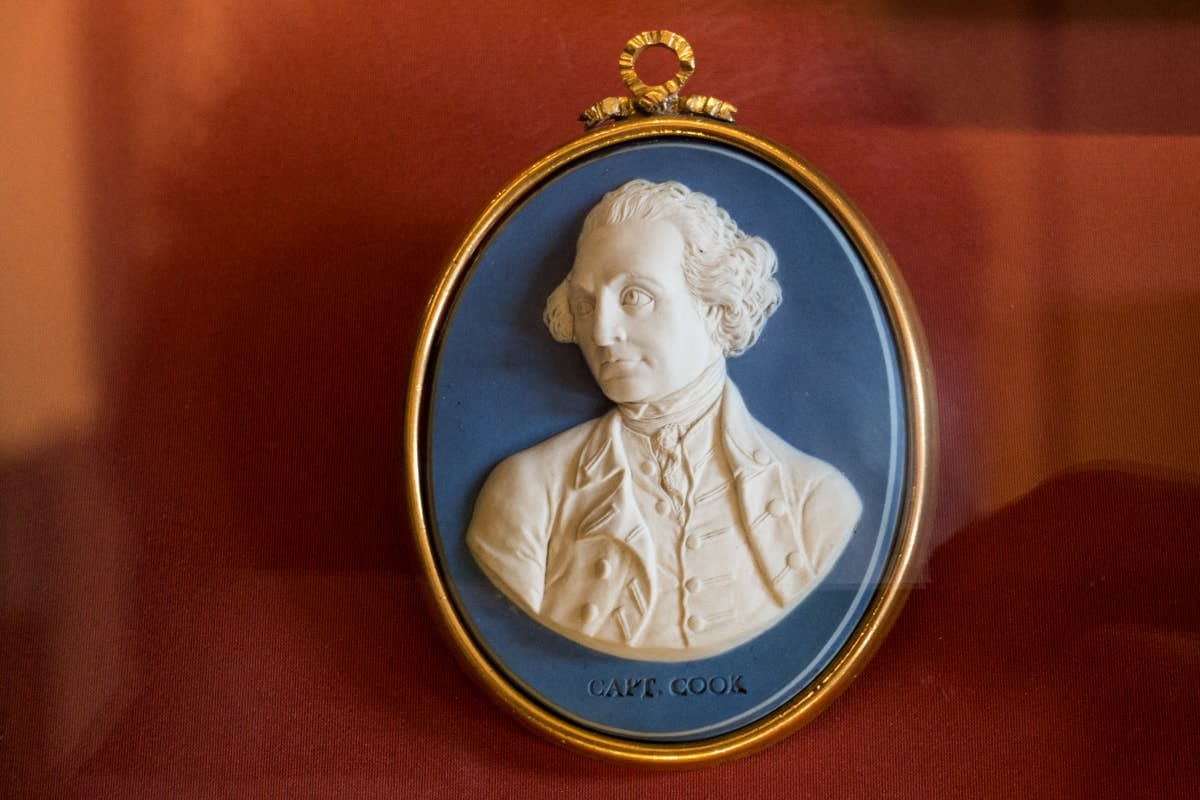
On 22 August, 1770 – 250 years ago – Captain James Cook sailed to a remote island in Torres Strait and raised the Union Jack.
He wrote in his journal: “I now once more hoisted English Coulers and in the Name of His Majesty King George the Third took possession of the whole Eastern Coast ... by the name New South Wales, together with all the Bays, Harbours Rivers and Islands situate upon the said coast.”
Possession Island, as it came to be known, was Cook’s last stop in the territory we now call Australia. Today, the island is part of a national park. Historically, it’s been inhabited by the Ankamuti and Kaurareg peoples, the Kaurareg claiming native title in 2001.
Cook sailed on to other adventures, unaware he would one day become a polarising figure – feted as the heroic navigator whose expedition made modern Australia possible, and deplored as the man responsible for the suffering and dispossession of its Indigenous people, his statues defaced.
Historian Bain Attwood argues both views are false.
“The significance Cook has had for so long has very little to do with what he actually did,” he says. “The voyage of the Endeavour up the eastern coast of the continent, and the short periods he’s on land don’t really have any significant impact on what happens afterwards. It’s nowhere near as important as what happened after British colonisation began in 1788.”

But like all myths, the stories surrounding Captain Cook contain an element of truth, he says.
Cook’s expedition, or rather the way its most influential member, Sir Joseph Banks, later represented the Aboriginal people, influenced the British decision to set up a penal colony in New South Wales. This in turn led to the subjugation, oppression and slaughter of Indigenous people across the continent and in Tasmania.
“But there’s no, as it were, necessary relationship between Cook’s so-called discovery of this place and his claim of possession on the one hand, and what follows afterwards on the other,” Professor Attwood says.
“The agents of many European imperial nations made claims of possession on the basis of ‘discovery’ in other places. But then nothing followed from those claims.”
“The agents of many European imperial nations made claims of possession on the basis of ‘discovery’ in other places. But then nothing followed from those claims.”
The Dutch explorer Abel Tasman, for instance, named and claimed possession of Van Diemen’s Land, which was later colonised by the British. When Cook sailed along the eastern seaboard, Tasman had already claimed possession of Australia’s western coast.
“As far as I know, there are no statutes of Tasman anywhere in Australia,” Professor Attwood says. “Why would any settler Australian deriving from British heritage want to draw attention to the fact that some other European nation had made a prior claim? But there are statues of Cook all over the country, in places where he never was.”
Before COVID-19 spoiled his plans, Prime Minister Scott Morrison wanted Cook’s visit in 1770 to be commemorated by the replica Endeavour circumnavigating the continent – even though the original Endeavour never made such a voyage.
“There’s also Aboriginal Captain Cook stories which have him in the Kimberleys,” Professor Attwood says. “There's one glorious story which has Ned Kelly as the first white man, and then Cook comes later. And Ned Kelly is the good white man, and Captain Cook is the bad white man.”
New Zealand's Cook 'creation story'
The real Captain Cook did circumnavigate New Zealand, also claiming possession. Yet – up until recently, at least – he’s been a less divisive figure there than he has in Australia. “But now some Maori are telling stories about Cook which are converging with the stories that Aboriginal people tell about Cook,” says Professor Attwood, a New Zealander who now lives in Australia.
He argues that one advantage New Zealand has over Australia is “its powerful creation story” – its Treaty of Waitangi with the Maori people. Australia has no such story, which is one reason why “Cook’s claim of possession looms much larger” in this country.
But myths are also told about the Treaty of Waitangi.
“There’s a real question about the basis upon which the British crown claimed sovereignty in New Zealand,” he says. “The Waitangi myth is that the treaty is fundamental to the British crown claiming sovereignty. And yet, historians can readily argue that British claimed sovereignty in New Zealand on grounds other than the treaty.”
Nevertheless, “the Treaty of Waitangi is absolutely central to the story about the foundation of New Zealand. The story it tells is that the British only assumed sovereignty on the basis of securing Maori consent.
“In other words, that the British sovereignty persuaded Maori chiefs to cede sovereignty to the Crown. No such story can be told in Australia.”
Meanwhile, across the Tasman, another story is told – that the British claimed Australia as “terra nullius – a land empty of ownership, or even that it was empty of people”, Professor Attwood says.
“You often hear people saying, ‘Oh, you know, when Cook claimed possession or when the British claimed possession here, they believed the land was empty of people’ ... If you unpack it, what they’re saying is the British proceeded as though there were no people here, as though there were no owners.”
Read more: First contact with Indigenous Australians? Captain Cook missed that boat by centuries
For Indigenous Australians, “this has enormous emotional truth”, he says. But the historical and legal facts of the case are different.
The term terra nullius gained popular currency at the time of the Mabo claim, when the High Court recognised native title for the first time, Professor Attwood says. But Cook, and later the British government, did not claim Australia on those grounds. Nor did Mabo’s legal team use the term.
British claim based on three doctrines
The British government’s legal claim was based on an amalgam of three legal doctrines, he says. These are discovery – the claim to be a territory’s first European discoverer; possession – the finders-keepers idea that a person or state who has something and intends to possess it should be regarded as the possessor; and usucapio – making a claim on the basis of possession for a certain period without interruption.
“Six of the seven judges who form the majority judgement in the Mabo decision realised that they needed to come up with a satisfactory story of why the law in Australia had not previously recognised native title,” Professor Attwood says.
“In other words, they had to explain why the law was changing its mind ... And the story of terra nullius is central to the story of how they justified their own decision.”
His own view is that the anger directed at Captain Cook might be eased if Australia became a republic.
“But what has to happen simultaneously is a treaty with Aboriginal people. If you do these things together, then Australia could tell a story about a new foundation.”
Bain Attwood’s most recent book is Empire and the Making of Native Title: Sovereignty, Property and Indigenous People (Cambridge University Press, 2020).





